- CITES and trade restrictions: Many species of dart frog (family Dendrobatidae), such as Oophaga, Phyllobates, and Colostethus, require CITES permits for legal trade and importation. These are regulated to prevent over‑collection from wild populations FROGFATHER.co.uk.
- Captive-breeding challenges: While some species like Dendrobates tinctorius and D. auratus breed well in captivity, others are much harder to sustain. Studies show captive success varies widely—even within poison dart frog groups FROGFATHER.co.uk+2Conservation Evidence+2naturalworldpets+2.
- Conservation concerns & legal hurdles: Species at higher risk in the wild are often placed under CITES Appendix I or II, meaning stricter control or total prohibition of trade. Importing or selling them in the UK becomes legally complex.
Together, these factors mean only a limited selection of species is commonly available here—and even then, only through careful, licensed channels.
🌐 What Are CITES Listings & How Do They Affect UK Hobbyists?
The Convention on International Trade in Endangered Species of Wild Fauna and Flora (CITES) is the backbone of legal wildlife trade control worldwide:
- Appendix I: Species threatened with extinction—trade permitted only in exceptional circumstances.
- Appendix II: Species not necessarily threatened with extinction now but that may become so unless trade is tightly controlled.
- Appendix III: Species protected in at least one country that has asked other CITES parties for help in controlling trade ScienceDirect.
For UK keepers, owning a species listed under CITES means:
- You need proper documentation and licences.
- It must be captive-bred under approved conditions.
- Selling or importing without correct paperwork is illegal and could harm conservation efforts.
For that reason, rarer species often don’t reach the UK hobby market, and many are reserved strictly for accredited captive-breeding conservation programmes.
🏛 Why Some Dart Frogs Remain Rare in the UK
- Legal limits
Many species are restricted by CITES listings, making legal import tricky or impossible without permits. - Breeding difficulty
Not all dart frogs reproduce reliably in captivity. Species requiring precise environmental cues or special diets may be nearly impossible for private breeders to maintain iucn-amphibians.org+3Conservation Evidence+3PMC+3. - Ethical sourcing
The UK and EU hobby communities strongly discourage purchase of wild-collected specimens. That further limits what’s legally available. - Red tape and cost
Even when breeding is possible, paperwork costs, veterinary checks, and documentation make rare species economically unfeasible for many UK breeders.
✊ We Support the RRK Campaign: Balanced Whitelists for Exotic Pets
Frogfather wholeheartedly backs the RRK (Responsible Reptile Keepers) campaign advocating science-informed whitelists—sometimes called “positive lists” or “species ap proved lists”—over blanket bans.
What’s the issue with blanket bans?
- A blacklist bans only specific species, but may still allow risky or unmanaged trade in unlisted animals.
- A whitelist (positive list) allows only species proven safe, non-invasive, and suitable for captive keeping.
Why RRK’s approach makes sense:
- It supports animal welfare, only permitting species that thrive in captivity.
- It helps prevent zoonotic risks, invasive species, and unmanaged trade.
- It avoids criminalising responsible keepers or breeders of vetted species.
In Europe, the EU is progressing toward adopting such a system—and RTT stands firmly behind calls for an evidence-based approach, not sweeping restrictions cites.org+2FROGFATHER.co.uk+2reptileforums.co.uk+2FROGFATHER.co.uk+8FROGFATHER.co.uk+8fws.gov+8.
✅ What to Take Away as a UK Frogkeeper
- Rare dart frogs are rare in the UK for legitimate legal and ethical reasons.
- Always prioritize captive-bred, documented specimens.
- CITES Appenix I or II listings significantly restrict trade—even for captive-bred individuals.
- Join and support the RRK campaign: balanced policy helps you keep healthier frogs, legally and sustainably.
📚 Want to Dig Deeper?
- Frogfather’s guide to poison dart frog regulations includes clear info about which species need CITES permits and how to stay legal in the UK Conservation Evidencenaturalworldpets+3FROGFATHER.co.uk+3ScienceDirect+3.
- Read more about the EU’s proposed positive list reforms and why they matter to UK pet keepers like you FROGFATHER.co.uk.
🔖 Final Thought
Keeping dart frogs in the UK means embracing both passion and responsibility. Many rare species remain scarce here to protect wild populations and ensure legal, welfare-focused breeding. We urge the UK hobby community to follow the RRK vision: keep what’s proven, breed responsibly, and back evidence-based wildlife policy.
If you’d like clarity on specific species, CITES paperwork, or where to find trustworthy breeders—just let me know.



